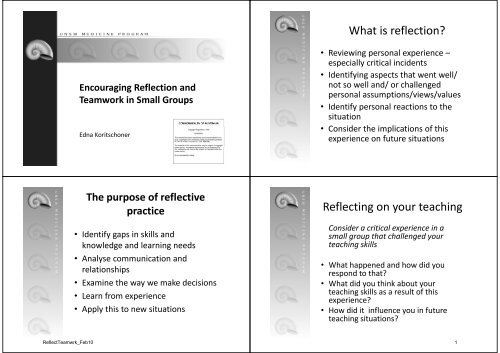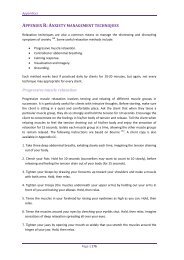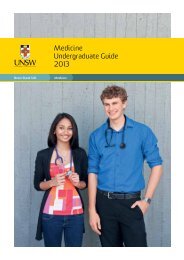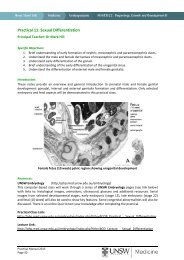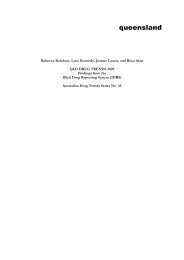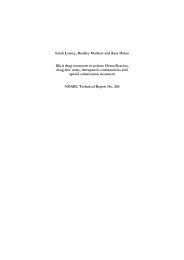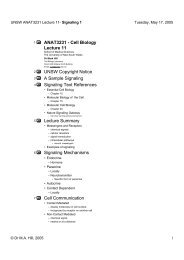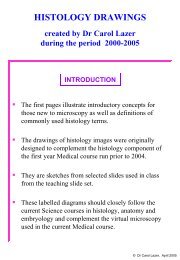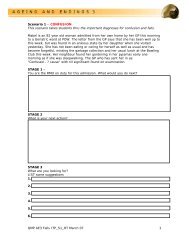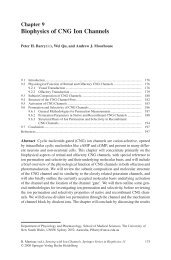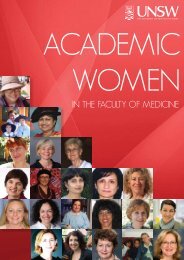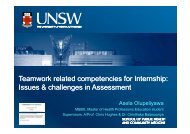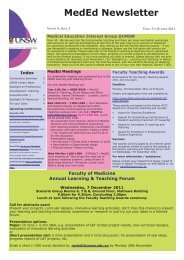What is reflection? Reflecting on your teaching
What is reflection? Reflecting on your teaching
What is reflection? Reflecting on your teaching
You also want an ePaper? Increase the reach of your titles
YUMPU automatically turns print PDFs into web optimized ePapers that Google loves.
<str<strong>on</strong>g>What</str<strong>on</strong>g> <str<strong>on</strong>g>is</str<strong>on</strong>g> <str<strong>on</strong>g>reflecti<strong>on</strong></str<strong>on</strong>g><br />
Encouraging Reflecti<strong>on</strong> and<br />
Teamwork in Small Groups<br />
Edna Koritsch<strong>on</strong>er<br />
• Reviewing i pers<strong>on</strong>al experience –<br />
especially critical incidents<br />
• Identifying aspects that went well/<br />
not so well and/ or challenged<br />
pers<strong>on</strong>al assumpti<strong>on</strong>s/views/values<br />
• Identify pers<strong>on</strong>al reacti<strong>on</strong>s to the<br />
situati<strong>on</strong><br />
• C<strong>on</strong>sider the implicati<strong>on</strong>s of th<str<strong>on</strong>g>is</str<strong>on</strong>g><br />
experience <strong>on</strong> future situati<strong>on</strong>s<br />
The purpose of reflective<br />
practice<br />
• Identify gaps in skills and<br />
knowledge and learning needs<br />
• Analyse communicati<strong>on</strong> and<br />
relati<strong>on</strong>ships<br />
• Examine the way we make dec<str<strong>on</strong>g>is</str<strong>on</strong>g>i<strong>on</strong>s<br />
• Learn from experience<br />
• Apply th<str<strong>on</strong>g>is</str<strong>on</strong>g> to new situati<strong>on</strong>s<br />
<str<strong>on</strong>g>Reflecting</str<strong>on</strong>g> <strong>on</strong> <strong>your</strong> <strong>teaching</strong><br />
C<strong>on</strong>sider a critical experience in a<br />
small group that challenged <strong>your</strong><br />
<strong>teaching</strong> skills<br />
• <str<strong>on</strong>g>What</str<strong>on</strong>g> happened and how did you<br />
resp<strong>on</strong>d to that<br />
• <str<strong>on</strong>g>What</str<strong>on</strong>g> did you think about <strong>your</strong><br />
<strong>teaching</strong> skills as a result of th<str<strong>on</strong>g>is</str<strong>on</strong>g><br />
experience<br />
• How did it influence you in future<br />
<strong>teaching</strong> situati<strong>on</strong>s<br />
ReflectTeamwrk_Feb10 1
Kolb’s Model<br />
Rolfe’s Model<br />
• Based <strong>on</strong> work by Rolfe et al<br />
Rolfe G, Freshwater D, Jasper M.(2001) Critical Reflecti<strong>on</strong> in Nursing<br />
and the Helping Professi<strong>on</strong>s: a User’s Guide. Basingstoke: Palgrave<br />
Macmillan;<br />
<str<strong>on</strong>g>What</str<strong>on</strong>g><br />
So <str<strong>on</strong>g>What</str<strong>on</strong>g><br />
<str<strong>on</strong>g>What</str<strong>on</strong>g> now<br />
Reflective Writing Tips<br />
– Include relevant examples to support <strong>your</strong><br />
learning in the capability<br />
– D<strong>on</strong>’t simply retell what you did in an<br />
assignment<br />
– Look at what factors, from <strong>your</strong> point of<br />
view, that resulted din str<strong>on</strong>ger or weaker<br />
performance and specifically name them<br />
– D<strong>on</strong>’t write general<str<strong>on</strong>g>is</str<strong>on</strong>g>ed clichés<br />
– D<str<strong>on</strong>g>is</str<strong>on</strong>g>cuss specific plans for the future –what<br />
you can do<br />
– Write in the first pers<strong>on</strong><br />
– Be h<strong>on</strong>est and open.<br />
Problem students<br />
• The d<str<strong>on</strong>g>is</str<strong>on</strong>g>engaged student<br />
• The d<str<strong>on</strong>g>is</str<strong>on</strong>g>ruptive student<br />
L<str<strong>on</strong>g>is</str<strong>on</strong>g>t the kinds of behaviour you think<br />
represent each of the above categories<br />
and d<str<strong>on</strong>g>is</str<strong>on</strong>g>cuss possible soluti<strong>on</strong>s – use<br />
some pers<strong>on</strong>al examples if you can.<br />
ReflectTeamwrk_Feb10 2
Developing Teamwork Skills<br />
Encourage self assessment<br />
Ask questi<strong>on</strong>s about both task and maintenance<br />
aspects<br />
Model appropriate feedback within <strong>your</strong> sessi<strong>on</strong>s<br />
Use the teamwork area within emed to provide<br />
written feedback<br />
Link these skills with practical implicati<strong>on</strong>s for their<br />
roles as future doctors<br />
Examples<br />
• Feedback about others<br />
P5: Evaluating harm minim<str<strong>on</strong>g>is</str<strong>on</strong>g>ati<strong>on</strong>, health promoti<strong>on</strong> and<br />
educati<strong>on</strong> campaigns to reduce r<str<strong>on</strong>g>is</str<strong>on</strong>g>ky alcohol c<strong>on</strong>sumpti<strong>on</strong> Report<br />
ID)07/01/2006(An<strong>on</strong>ymous) )<br />
(Name) attended most meetings and was an active member during<br />
the initial research stages. Though, it would be useful if he could<br />
inform a fll fellow team member if he <str<strong>on</strong>g>is</str<strong>on</strong>g> unable to attend a meeting,<br />
as it would aid planning. During the meetings, (Name) offered<br />
several ideas and willingly l<str<strong>on</strong>g>is</str<strong>on</strong>g>tened to the thoughts of others. H<str<strong>on</strong>g>is</str<strong>on</strong>g><br />
enthusiasm and openness c<strong>on</strong>tributed to a friendly warm team<br />
envir<strong>on</strong>ment. (Name) completed h<str<strong>on</strong>g>is</str<strong>on</strong>g> tasks within the planned<br />
period and received feedback in a c<strong>on</strong>structive manner. H<str<strong>on</strong>g>is</str<strong>on</strong>g><br />
technical skills proved to be a valuable asset for our presentati<strong>on</strong> to<br />
the scenario group.<br />
examples<br />
P2: Causes of Inflammatory Bowel D<str<strong>on</strong>g>is</str<strong>on</strong>g>ease<br />
(Report ID)26/07/2005(Author name)<br />
(Name) attended most meetings and was flexible about meeting times. He<br />
participated in group d<str<strong>on</strong>g>is</str<strong>on</strong>g>cussi<strong>on</strong>. Usually, I did not feel that he was prepared for<br />
the meetings or had thought about the task thoroughly beforehand. He offered h<str<strong>on</strong>g>is</str<strong>on</strong>g><br />
own ideas, which were always taken up by the group and he was always<br />
encouraged. He was prepared to accept others' ideas and was not argumentative. I<br />
felt as though, that he had a lot of trouble with research, admitting he was unsure<br />
of how to go about it. Therefore the work that he c<strong>on</strong>tributed to the paper was<br />
not equal to the other team members. He did however c<strong>on</strong>tribute well towards<br />
the powerpoint presentati<strong>on</strong> with a high quality of work. I felt that he l<str<strong>on</strong>g>is</str<strong>on</strong>g>tened to<br />
others but took <strong>on</strong> very little initiative. He accepted tasks delegated to him but<br />
rarely suggested them. I was d<str<strong>on</strong>g>is</str<strong>on</strong>g>appointed in the quality of h<str<strong>on</strong>g>is</str<strong>on</strong>g> written work but<br />
with an understanding of h<str<strong>on</strong>g>is</str<strong>on</strong>g> challenges in researching can see th<str<strong>on</strong>g>is</str<strong>on</strong>g> may have been<br />
the reas<strong>on</strong> for th<str<strong>on</strong>g>is</str<strong>on</strong>g>. (Name) was willing to try new things and I feel that if he was<br />
more prepared and c<strong>on</strong>scientious he could be an imaginative, c<strong>on</strong>siderate and<br />
pleasant group c<strong>on</strong>tributor.<br />
examples<br />
• Feedback about self<br />
2: Causes of Inflammatory Bowel D<str<strong>on</strong>g>is</str<strong>on</strong>g>ease<br />
Report ID)26/7/2005(an<strong>on</strong>ymous)<br />
I attended all of the meetings except for <strong>on</strong>e because of illness and was flexible<br />
about meeting times. I always prepared for meetings and was active and<br />
c<strong>on</strong>scientious in my c<strong>on</strong>tributi<strong>on</strong>s. I felt that I c<strong>on</strong>tributed a high standard of work<br />
and effort towards the task. I had trouble in the beginning of the task with my time<br />
management. I had a lot of outside commitments which made it impossible to<br />
c<strong>on</strong>tribute as much to the first few weeks work as I would have liked. However, I<br />
always met the prom<str<strong>on</strong>g>is</str<strong>on</strong>g>es I had made when it came to tasks and made sure I read<br />
others' work and made c<strong>on</strong>structive comments. I used th<str<strong>on</strong>g>is</str<strong>on</strong>g> challenging time as a<br />
learning exerc<str<strong>on</strong>g>is</str<strong>on</strong>g>e in my time‐management, management cutting down my outside work hours<br />
and focusing <strong>on</strong> being efficient in the time I had available. I felt that I c<strong>on</strong>tributed<br />
to keeping the group <strong>on</strong> track and was well aware of meeting the capability<br />
outlines for the task, as well as focusing <strong>on</strong> using the time efficiently. I feel as<br />
though h I could have been more understanding di towards (Name) during the group<br />
process. He frustrated me a lot because he was unprepared and unwilling to work<br />
as hard as the other group members.<br />
ReflectTeamwrk_Feb10 3
examples<br />
P2: Causes of Inflammatory Bowel lD<str<strong>on</strong>g>is</str<strong>on</strong>g>ease<br />
For the first part of the project I feel as though I was<br />
encouraging g towards (name)but I gave up towards the end<br />
and became unsupportive. Towards the other group<br />
members I was supportive and encouraging and was<br />
genuinely impressed with their dedicati<strong>on</strong> and<br />
c<strong>on</strong>scientiousness. Th<str<strong>on</strong>g>is</str<strong>on</strong>g> was all a good opportunity to learn<br />
skills in teamwork. It was valuable to understand better<br />
how I interact with others in such an envir<strong>on</strong>ment and that<br />
I need to develop my tolerance of others, their pace or<br />
work, their approach; and also to learn better ways to<br />
encourage difficult members to work more effectively and<br />
possibly to make them feel more accepted.<br />
ReflectTeamwrk_Feb10 4


